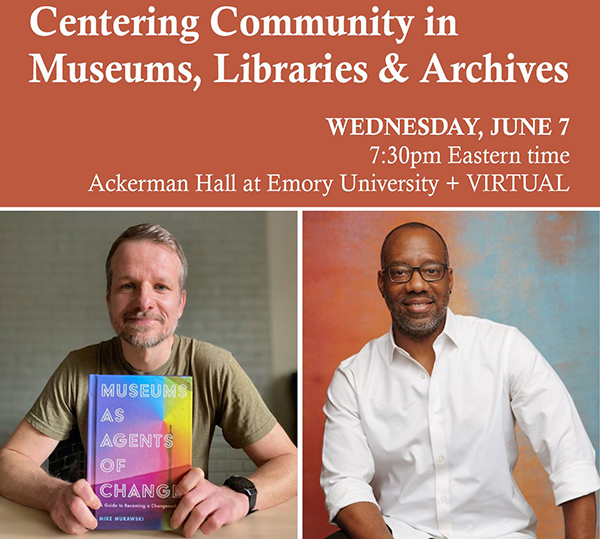What would it look like for archives, libraries, and museums to value their communities over their collections? How can these institutions more fully embrace practices of listening and relationship building, while interrupting traditional practices rooted in colonialism?
The Emory and Atlanta communities are invited to “Centering Community in Museums, Libraries, and Archives” on Wednesday, June 7, at 7:30 p.m. The conversation will feature Clinton Fluker, PhD, recently appointed as senior director of culture, community and partner engagement for the Michael C. Carlos Museum and Emory Libraries, and Mike Murawski, PhD, consultant and author of “Museums as Agents of Change: A Guide to Becoming a Changemaker” (2021). They will discuss the role of libraries and museums within their wider communities, how to begin reshaping what institutions value, and what it means to have a human-centered approach.
This event is free and open to the public. To register for the in-person event in Ackerman Hall at the Carlos Museum, click here. If you prefer to attend virtually, please register here. Parking is free on Emory University’s campus after 6 p.m.
Both event registration options can be found here.
Murawski has been working with the Carlos Museum as it begins to put more focus on community over collections.
“Museums, libraries, and archives hold the potential to be transformative spaces where we can embrace and amplify the creativity, stories, cultures, voices, and experiences that come from our local neighborhoods and communities,” Murawski says. “We just need to take bold steps to de-center the traditional sense of authority that so many museums and libraries are based on, and let our community in. And as uncomfortable and messy as this might be for so many museums and libraries, we have got to start somewhere and make this change happen starting right now.”
In his recent article “Undoing the Tyranny of Expertise,” Murawski writes:
“[Carlos Museum Director Henry] Kim envisions a deeper engagement with audiences and communities, seeing communities as knowledge holders, idea shapers, and co-creators of museum programs moving forward. As [Vice Provost of Libraries and Museum Valeda] Dent states, ‘We have more to learn than to teach.’ Both agree that working more authentically with communities involves reversing and undoing the ‘tyranny of expertise,’ referring here to the prevailing yet harmful practice within museums to overvalue academic, curatorial knowledge and devalue community-based knowledge and expertise.”
Murawski previously served as the director of learning and community partnerships for the Portland Art Museum; as contributor to Museums as Sites of Social Action (MASS Action) initiative supporting equity and inclusion in museums; and as project advisor for the OF/BY/FOR ALL initiative helping civic and cultural organizations grow of, by, and for their communities.
Prior to his new position, Fluker was the curator of African American collections at Emory’s Rose Library. He is the co-editor of “The Black Speculative Arts Movement” (2019), a collection that enters the global scholarly debate on the emerging field of Afrofuturism studies. Fluker is also the cofounder of Thrdspace, a consulting firm that helps clients build communities around their missions through insights, experiences, and imagination. As a visual artist, Fluker had his work included in the New York Live Arts 2020 exhibition, “Curating the End of the World,” where his interdisciplinary pieces were presented as meditations on the themes of memory and fragmentation.
Related links:
Emory to include libraries and museum under new leadership structure

